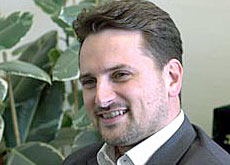ICRC on a mission to explain

The International Committee Red Cross is throwing off its traditional secrecy.
The ICRC’s director of operations, Pierre Krähenbühl, says the Geneva-based organisation now realises it has an obligation to explain its actions.
The winds of change have swept through ICRC headquarters. The organisation’s decisions are no longer a question of old-fashioned Swiss collegiality, since increased powers were placed in the hands of the new director-general, Angelo Gnaedinger.
Around him he has a new and youthful directorate, epitomised by the 36-year-old Krähenbühl, who has served the ICRC in places like Kosovo, Bosnia, Afghanistan, Peru and El Salvador.
Rejuvenated
This rejuvenated leadership took over last month. The changes come at a time when – as a result of the US-led “war on terrorism” and Israel’s actions in the Palestinian territories – international humanitarian law is under close scrutiny.
Krähenbühl says the “unipolar” world that has emerged since the end of the Cold War – with just one superpower and its assorted allies – has created a series of challenges for humanitarian agencies.
There has been a proliferation of non-state actors who have a less than solid grasp of international humanitarian law – or worse, utter contempt for it. Conflicts are today also less likely to be self-contained
“This unipolar dimension is superimposing itself on an already complex unpredictable reality,” Krähenbühl told swissinfo.
“We at the ICRC have expertise in individual contexts. We now have to strengthen out ability to see the links between these contexts,” he said, adding that the ICRC would have to “enlarge and diversify” the parties it dealt with.
Perceived as western
Krähenbühl says the polarisation of the world leaves a neutral, impartial organisation like the ICRC in a tricky position, and it has to sell its message to those who feel excluded.
“The ICRC is still perceived in a number of countries as an essentially Western organisation,” he says. “Our identity has to be explained and understood. We have to establish our roots more firmly in other cultures and civilisations.”
He points out that one third of ICRC spending goes to Muslim countries, and it is up to the organisation to make this more widely known.
Krähenbühl says the shift in approach at ICRC headquarters is a result of the experiences of a new generation of delegates who have seen post-Cold War conflicts at first hand.
“They have realised that it’s no longer sufficient to base the legitimacy of our operations solely on the mandate. We need to convince people about how and why we do things,” he says.
“That is true for donors, for partners, for the media and, in particular, for the victims of conflict themselves. They will increasingly challenge the decision taken on their behalf.”
by Roy Probert
A new leadership team has taken over the International Committee Red Cross – and has promised to shed the organisation’s traditional secrecy.
The ICRC says it must respond to international changes – and the emergence of a “unipolar” world – by explaining its actions.
It also says it must explain its mission and establish roots in other cultures and civilizations.

In compliance with the JTI standards
More: SWI swissinfo.ch certified by the Journalism Trust Initiative
You can find an overview of ongoing debates with our journalists here . Please join us!
If you want to start a conversation about a topic raised in this article or want to report factual errors, email us at english@swissinfo.ch.